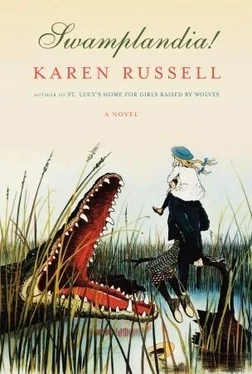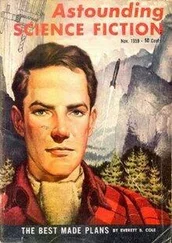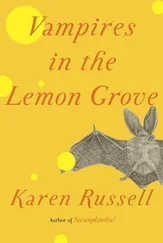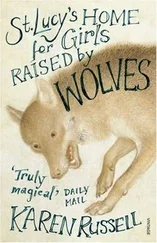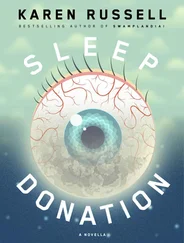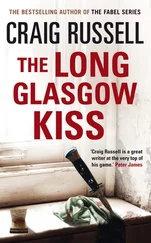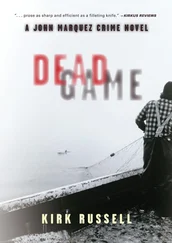I started to think it might not be a terrible thing if the Bird Man found me. A little later I began drafting my apologies to him for leaving. If he had water, I wanted him to find me now. I didn’t care at all what happened afterward …
Then I pushed through a stand of palms and saw the house. It was a one-room bungalow, the sort of dilapidated structure that swamp rats like Grandpa Sawtooth used for a fish camp or a hunting cabin. A tripod of sticks held a resin pot over a stack of pinewood; a stiller pump stood pondside. My heart leapt — my first thought was that we must have rowed to the Gulf coast, where you could find a few actual towns on the elevated pinelands. I got it in my head that I was walking toward a town. It didn’t matter that nothing else I had seen or smelled or heard in the last few hours bore this theory out: I was on the outskirts of some island community, I decided, a place with televisions, telephones, refrigerators filled with sodas and cold cuts and cans of whipped cream, paper towels, pet dogs, telephone wires — I was on a roll now, I was close to blinking back tears — generators! electric light! hot showers! toilet paper! I walked behind the first house.
“Hello?”
This first house appeared to be the only house. A live alligator was sunk into the mud behind the southernmost wall, watching me as I scouted the perimeter. Switchgrass sprayed like a little beard beneath the blue-black apples of its cheeks. Its grin upset me in a way our Seths’ musculature never did back home.
“It’s not funny,” I hissed. “You’re the clown, you stupid monster, you don’t know anything, you don’t love anyone, you can’t even imagine …”
I looked inside a begrimed window and I thought: abandoned . For sure nobody lived here. There was a straw pallet on the needle-covered floor and no furniture that I could see. Dishes on shelves, little cups. Outside its wooden walls had been completely overtaken by weeds and strangler fig, thick vines doing their weird tethered ballet when the wind blew. Water thinned to a brothlike cup between the mangroves. Oh, yes , I thought. I was going to drink all of it.
Thirst dragged me by my neck to the bottom creek and I was halfway to water before I noticed the clothesline. Clotheslines, I realized — there were half a dozen of them strung like a winking web in the high branches. Clothes were snapping all along both banks of the canal. The blouses nearest to me hung like cutouts against the sun, pinned and flapping. Sunshine turned them mild shades of gold or ghostly whites. The vaguest beiges made me think of photographs waiting to develop.
Some of the clothes looked antique. I found a woman’s glove with a star-shaped wine stain over the palm. Each finger was bent against the wire by a clothespin. Many of the items looked burned and stained, moth-eaten. A gingham sundress had holes that I could have put my fist through. I thought again of photographs in the developing solution of the blue-violet air. Only the sky out here seemed like a deteriorating solution — it was erasing them.
A black hat brim — just the brim — hung from two pins like a shocked O.
Oh . I took a step toward the tree line, and for a second the maze of clotheslines looked as if they went on forever and ever. A line of billowing dresses that stretched to infinity, missing their women. All the silhouettes were wrinkling. Then I blinked and the image of an eternally twining line was gone. The clothes just looked like dirty old clothes strung from one branch to another again, mosquitoes shimmering vacantly around them. But where had all this clothing come from, in the middle of the swamp? Mama . The name came to me without warning out of the aching blue sky. Mama Weeds .
There is a legend in our swamp about a lady, a laundress — or a ghost, or a female monster — named Mama Weeds. She was like an island bogeyman. Her story predated us. The Chief liked to tell it to tourists: he’d ham it up and do all the different drawling voices like a radio play.
Mama Weeds started life as a real woman, Midnight Drouet, a light-skinned black seamstress descended from freed slaves who lived in the Ten Thousand Islands. A beautiful woman, so quiet that strangers assumed she was mute, with no real interest in rearing children or marrying a man. She moved to the deep interior of the swamp and worked there as a seamstress and a laundress; the pioneers could leave their clothing with her and she’d sew up holes and sew on faux gold buttons, a bottomless bucket of which she’d brought with her from the factory that once employed her in Troy, New York. People swore that she could get any stain out in the river by her house. Her few neighbors, moonshiners and gator skinners among them, were incensed by her presence.
“You won’t make it,” they told her. “You won’t last the wet season. You’ll howl at all the mosquitoes, the snakes, the scalybacks that dig their holes beneath your floorboards.”
But Midnight Drouet didn’t howl and she didn’t go mad — the way my dad told the story, her composure was like a gun she kept cocked and pointed at her door. Five years later the gator skinners were infuriated to discover that she had, in fact, made it and lasted. Midnight built her own buttonwood shack and never asked for anybody’s help. She refused to let her neighbors hunt on her property. One day she mentioned to the bird warden that she’d shot a ten-foot alligator with her.22—he had been going for her dog, she said, a huge smoky mongrel named Luke. No: she had not bothered to skin the alligator for the tanneries. No: she hadn’t tried to sell or cure its meat. Word of this failure to profit from slaughter got around and the glade crackers were appalled — the Depression was on and here she’d killed an alligator with a huge dollar value and refused to skin the damn thing? Unforgivable. Selfish. Evil. Any one of them would have been glad to turn the carcass into coins for their own families. Apparently the bull gator’s head had languished in the water behind her house until the scales slipped, its hide moon-permeated and worthless.
And then it’s said that a man out there, or several men, rowed over to her island at night. “He” or “they” killed Miss Drouet, in cold blood. The decision was cold cognition, explained my brother, who liked to add a pinch of forensics to our gory swamp legends. Most people believe it was the work of several men, owing to the kind of damage that they reputedly did to her. For no other reason than that she’d killed that alligator and let it rot! A cardinal sin in those days, according to the Chief, back when people were killing the last snowy egrets for a buck five …
This part always made me dart under the covers, because I couldn’t stop seeing poor Miss Drouet in my mind’s eye, gagged and dragged down to the water by her murderers, dead already and now drowning, too, her cloth dress opening like a flower on the swamp water in a mixed-up and evil chronology. Her dead body floating. Her dead face, the mask of it, rising and falling on the sea’s uneasy breath.
Panthers found and finished her in the cattails. Wind unstitched her skeleton. Weeds sprayed outward from the heart-shaped wreck of her pelvis; a sinkhole opened beneath her and gave way with the suddenness of caved ice, swallowing her bones. Children who had never heard about Luke or Midnight Drouet began to report seeing a shadowy figure along rivers, beneath the dry fingers of palms. “Mama Weeds!” a little glade cracker boy called her: the woman he saw was standing in the Caloosahatchee with a quiet dog by her side, covered in pigweed. The first child who saw her hadn’t been frightened: she was doing laundry, he said, beating clothes against rocks, beating the dyes and patterns right out of them until colored oils ran downstream in twining browns and indigos and reds. The name stuck. If ever you saw a woman alone at the edge of the swamp at dusk, that lady was her, that was Mama.
Читать дальше
